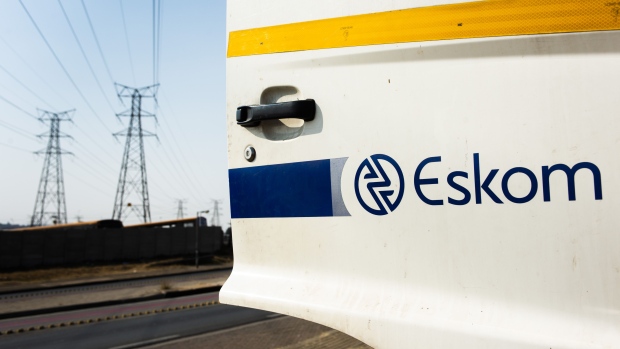Sep 15, 2020
South Africa Agrees Pact to Fix Struggling State Power Utility
, Bloomberg News

(Bloomberg) -- South Africa’s government, business groups and labor unions said they have agreed on a pact to turn the country’s debt-stricken state-owned power utility around and increase electricity output to address rolling blackouts.
The accord, a copy of which was seen by Bloomberg, calls for Eskom Holdings SOC Ltd.’s 488 billion rand ($30 billion) of debt to be reduced and for adequate resources to be “mobilized” to ensure it becomes financially sustainable -- but is scant on detail on how this will be done.
“Finance mobilized will provide investors with appropriate long-term, stable and reliable social and financial returns,” the National Economic Development Council said in the plan, which was agreed Tuesday.
The plan makes no mention of a previous proposal for the Public Investment Corp., which manages the pensions of state workers and has assets of 2.1 trillion rand, to take over part of Eskom’s debt. Institutions that make funds available must do so within the mandates and risk-mitigation processes can’t be compromised, it says.
Greatest Threat
Eskom, which provides about 95% of the nation’s power, isn’t selling enough to cover its costs -- a legacy of years of mismanagement, inadequate maintenance and overruns at its two newest plants. The utility’s inability to supply sufficient electricity has curbed growth, with Goldman Sachs Inc. describing it as the greatest threat to the economy.
The company is at the forefront of a group of South African state-owned companies to have run into financial distress and are now in need of funding. The National Treasury said in July it would also “mobilize” more tha 10 billion rand of funds for bankrupt carrier South African Airways, though the financing has yet to be delivered.
The pact commits the government to removing all regulatory obstacles that hinder companies from generating their own electricity, while businesses agreed to implement projects to add 2,500 megawatts of supply within two years. The government also agreed to buy an additional 2,500 megawatts of emergency power, 500 megawatts more than previously announced.
Eskom was given the green light to renegotiate overly onerous contracts with coal suppliers and independent producers of green power that supply the national grid as soon as possible.
That process will ensure “an outcome that is sustainable for suppliers, ensures a fair return, is affordable to Eskom and is within the confines of the law,” according to the pact.
Other highlights:
- Eskom needs to review all its material contracts to ensure that they aren’t corrupt and ensure it isn’t overpaying for goods and services.
- Power prices must be cost-reflective and simultaneously be affordable for businesses and households.
- Eskom must adopt a zero-tolerance approach toward corruption and law-enforcement agencies should be given the capacity to prosecute anyone found to have misappropriated its funds.
- Eskom’s operating model will be reviewed with a view to addressing its bloated management structure and associated costs.
©2020 Bloomberg L.P.


